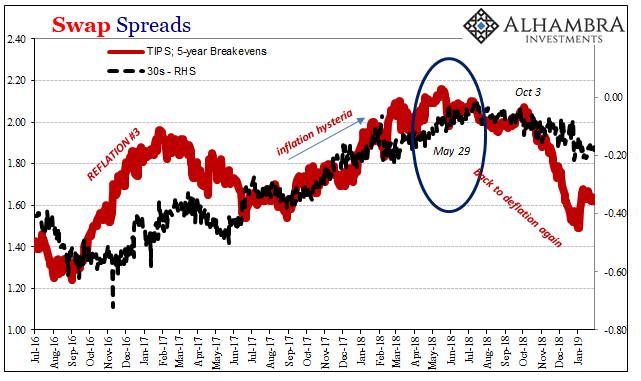I have to agree with my colleague Joe Calhoun. Everyone thinks the Fed is (over)reacting to the stock market drop in December. There’s a little bit of truth in it, reading so many FOMC transcripts as I have you get the unmistakable sense the S&P 500 is unofficially included on the policy dashboard. In the early part of 2007, policymakers certainly cared more about the NYSE than they paid attention to eurodollar futures.
I doubt, I know they’ve learned nothing from the debacle.
Still, what broke the stalemate wasn’t likely the DJIA. Powell was incredibly stubborn about wages and the strong economy until just recently, that’s true. Even a 20% share price correction doesn’t change his mind, though. It was instead inflation expectations, along with other market prices related to them (like swap spreads).

I wrote back in June 2017 near the outset of globally synchronized growth (the narrative), long before inflation hysteria, that consumer prices would be the decisive factor:
…the extreme nature of the unemployment rate has finally forced Yellen’s hand. It really is a binary option at this point: admit the unemployment rate is faulty and open the can of worms about the last ten years, or keep the faith as she has done all along and bet it all on an imminent surge in something. Markets have already deserted the Fed.
So long as inflation breakevens trended somewhat higher, backed by WTI, Fed officials like Yellen and Powell could keep up the pretense how the economy was moving along as they claimed. They could maintain the hope and expectation for that imminent surge. In fact, that’s what has spelled Powell’s entire tenure so far – proof for the unemployment rate is coming.
For the bottom instead to fall out for expectations like it did in the second half of last year could only mean one thing. Hawks nor doves, what truly matters is why any officials take the position they do. I wrote earlier in 2017:
What drives UST yields or eurodollar futures prices is therefore not “hawkishness” or “dovishness”, but rather perceptions about whether “hawkishness”, “dovishness”, Trump, or even Paul Krugman’s fake alien invasion scenario will amount to anything positive and the significance of it. It is the translation of current conditions into considerations about the future, captured in prices and yields – the actual discounting of information, of which monetary policy is only a (variable) part.
The meeting minutes from the December FOMC, the epic flip flop, said it all. Muted. Inflation can’t be muted with several years way under “full employment.” It isn’t imminent.
The can of worms has finally spilled out all over the mainstream. It is today way too much to digest for the vast majority of people, but I have little doubt that is coming given enough time. What happens when, in contrast to years of assurances, everyone suddenly realizes the unemployment rate wasn’t a good measure of economic progress? The Fed’s surrender is just the start.

Stay In Touch